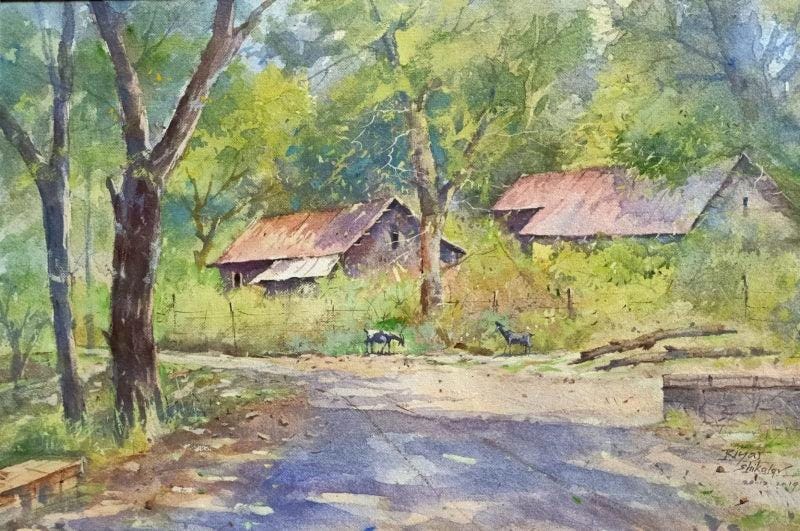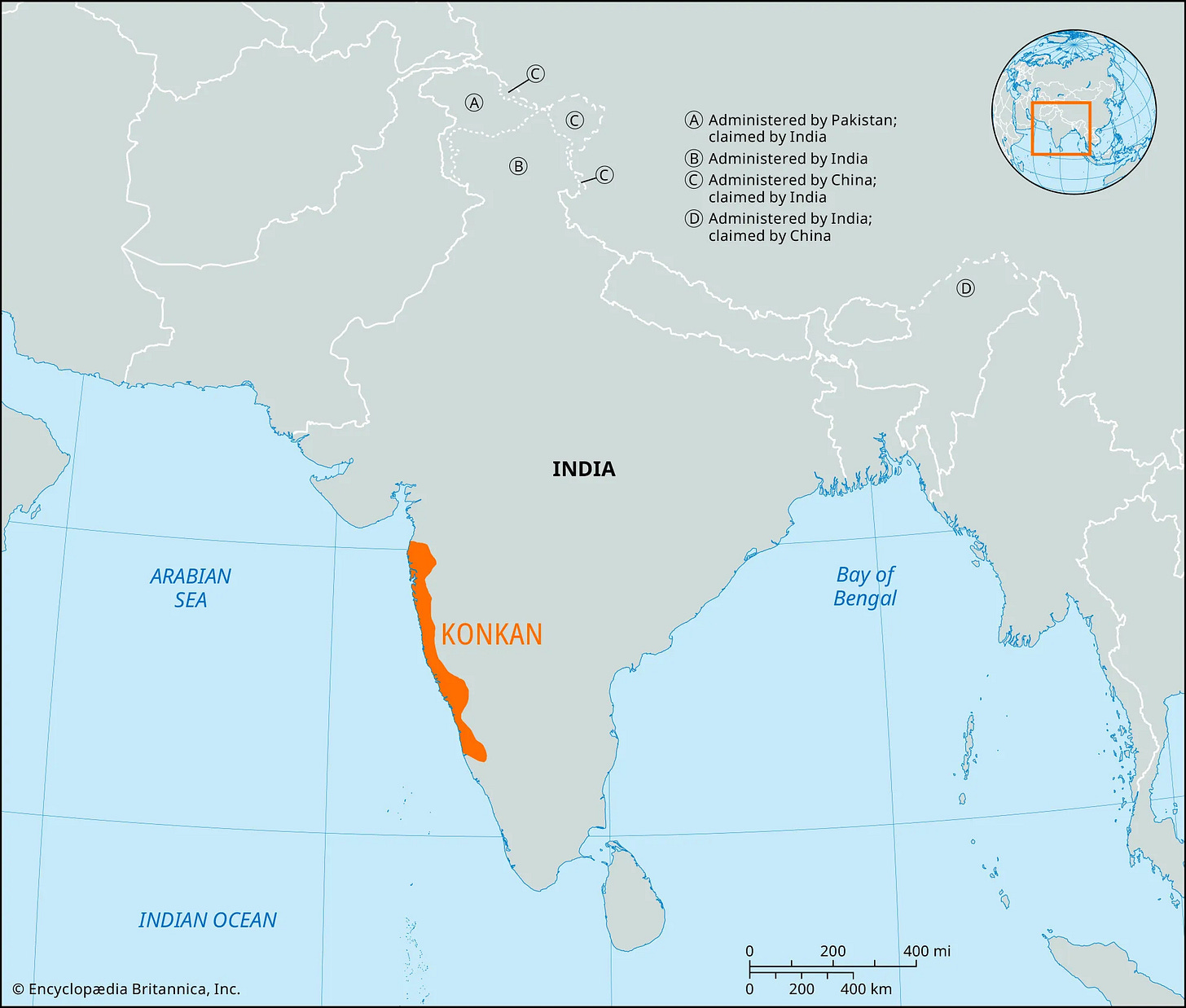It is a warm afternoon in Narvan. The trees in our backyard are swaying with the westward wind. The waves are crashing on the rocks in the distance where the sea meets the land. One can occasionally hear a woodpecker pecking its beak into the coconut tree. The clouds, although few, are playing hide and seek with the sun. Sanju dada’s cow is munching on the overgrown grass, taking laps around the coconut tree to which it is tied. The Wi-Fi has been down since this morning. A call came in earlier: “We are trying our best to restore the internet, but a tree has engulfed the Wi-Fi fibers after it decided to end its life and lie on the ground.”
Sometimes, I wonder why I ever brought the internet to our little haven. Life thrived without it, untouched by the rush of the outside world—fewer expectations, fewer complications. Yet, if not me, someone else would have tethered us to the digital tide. Life before the internet felt slower, softer. No one hurried, even the hardest moments were handled with grace, not haste. But now, everything demands immediacy.
When my grandpa lost his dad, he was stationed in Nagpur—some 6-700 km from this village. There were no phones, only a few fax machines, and postcards as sources of information. Grandma had sent a postcard with a government officer, who delivered it to my grandpa. He reached a week late to his dad’s funeral, and yet when I ask him about arriving late, he simply says, “There weren’t any technologies back then like there are today. We were okay with not knowing, and there wasn’t really any other option.”
Today, we are constantly connected to each other. It’s good in a way—it has its upsides—but we can’t deny that it kills the authenticity of our lived experience. We share. No, we overshare information. Now, we don’t only want to know the milestones or dreadful incidents in each person’s life, but we also want to know what they do every day—every minute, even. We endlessly scroll through WhatsApp stories, just in case we might miss someone else’s life. It affects us.
In trying to be overly connected, we forget to live an individual experience—the kind of experience that my grandparents' generation fully lived. For them, the harshness and unpredictability of life were just normal phenomena. You lived through it—you never moaned about it. Not for me, though. Now, my parents want to know every move I make. They want to know what happens in my life—daily. Phones and social media keep us hooked in our tiny circles, never wanting us to look outside them, never wanting us to expand our horizons or consciousness. These things thrive when we go unconscious.
Let me tell you this: No one—truly no one—lives an extraordinary life every single day. Some days are mundane, others restless, and many are simply boring. We don’t want to share those ordinary moments, so we embellish, we lie. We say we’re in a different city when we’re just down the street.
Each individual lives in their own reality—it is shaped by the events that have occurred in the past. These are two different worlds, and they cannot be compared simply because you now have a device that makes you feel like the next person is in front of you. Yes, we are social creatures, and we do crave connection, but it is human connection that we crave. The physical touch, the witnessing of the other person with all our senses—not just virtual talk. Virtually, we are simply sharing our thoughts and then going on to live in our separate realities. But when we meet physically, we share an experience, we share emotions, we connect on a much deeper level.
All these thoughts drift away from my mind as soon as my grandma calls from within the house, “Ashu, the internet is up now. You can get back to work.”
I stand up, but my heart resists. I don’t want to return to the screen, to the endless noise. I want to sit here, in the backyard, and simply be. The internet pulls me away from this stillness.
I want to see the mongoose dart across the earth, freezing when our eyes meet. I want to watch the snake bask in the sun’s warmth, its scales shimmering like bronze. I want to witness the coconuts fall from the tree, bouncing softly on the soil before settling into their final rest. I want to learn from this ancestral wisdom, whispered by nature herself—not from strangers on the internet. After all, these creatures have lived in the present moment long before we ever worried about society, politics, or Wi-Fi. I want to see the squirrel leap from the mango tree to the cashew, performing acrobatics on the Wi-Fi wire.
Oh no! Maybe not the Wi-Fi wire again.
If you have reached this far then I hope it means you like what I’m doing and if so you might consider supporting me by ‘buying me a coffee’ ( Substack does not let me monetize my articles because I am based in India) which is a one off payment rather than a continuous subscription. Payments, however small, encourage me in my writing and mean that I can spend more time honing my skills.
You can buy my book about my 1800 km walk through India through my website. Thankyou, really!
There is one more thing by the way.
Most of you joined this Substack after reading stories from Saving a Village. In that series, I spoke about the urgency of taking action against the looming threats of deforestation, coastal highway projects, and the chemical and oil factories set to rise in this eco-sensitive zone. These developments could devastate many villages, including mine. That’s why I’ve decided to embark on a 500-kilometer journey across this stretch of land.
My purpose isn’t political, nor am I here to point fingers at specific companies or factories. Instead, I want to visit each village, sharing the message that while change is inevitable, it’s vital that we steer it in the right direction. I have no desire to cast myself as a hero; my goal is simply to witness this land and its fading culture before it's too late. However, if I can raise awareness and ignite even a small spark of understanding, I’ll be content knowing I did what I could.
But I can't do this alone. To plan the walk and cover necessary supplies, I need your support. Unfortunately, platforms like Kickstarter and other crowdfunding sites aren't available to me here in India, so I’m relying on your donations. You can contribute through PayPal—here’s the link. For donations over $30, I’d love to send you a personalized postcard as a token of gratitude.
I’ll delve deeper into this journey in the upcoming newsletters. Thank you for your support!





Arjuna :
Tell me of those who live in wisdom,
Ever aware of the Self, O Krishna;
How do they talk, how sit, how move about?
Sri Krishna:
They live in wisdom
Who see themselves in all and all in them,
Whose love for the Lord of Love has consumed
Every selfish desire and sense craving
Tormenting the heart. Not agitated
By grief or hankering after pleasure,
They live free from lust and fear and anger.
When I was a boy, we visited family each year in Southern Alberta, Canada. Their ranch was in an area where the Porcupine Hills met the Alberta Prairie and abutted the Livingstone Rocky Mountain Range. This was God’s country! I would rise early in the morning and climb the hills, from the river valley below, to watch the earliest rays of the sun display all the colors of those mountains. I felt the Lord! I felt part of His creation! And joy filled my heart.
Today such moments just might be disturbed by the need to immediately post a photo and comment on social media! These precious moments between the Creator and creature are as fleeting as the sunrise. These fleeting moments are fractured by invasive technologies that demand our attention and draw us away from “the moment”. And yet, we know deep in our souls “the moment” is what we desire.
For me, as I move to retirement, I recognize thirty years of the internet has only increased my lust to know. I am in constant contact with screens and literally force fed information by those who design programs to grab my attention. Rare is the individual who has broken free from the internet, which I now call The Beast. I am trying to recreate “the moments” I experienced as a boy. But how? How do I master technology so I control it rather than it controlling me? Is this possible? Or do we simply live in a new paradigm and the old way of relating to creation is gone because of The Beast.
One way I will experiment with setting myself free is to return to penmanship. The connection between mind and hand and pen and paper brings me joy. Writing by hand allows one time to think. It is not as efficient in producing volumes; but maybe volumes is not what we need! We don’t need speed; we need to slow down; to put on the brakes. A pen in hand does this. The world has been changed by letters, written by the human hand, from jails. Gandhi wrote from jail and freed India from British rule! St. Paul wrote Epistles! Martin Luther King wrote his Letter from Birmingham Jail. Prison gave them isolation from distraction and time to focus and create. It set them free. Perhaps blocks of time with pen and paper can also set us free from the technological prisons that prevent “The Moment”!